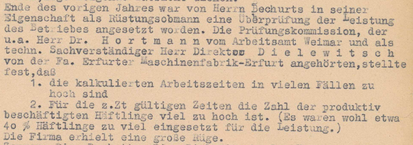Kurt Hortmann – Director of the Weimar Labour Office
He served as a soldier in the First World War from April 1918. After the war, he studied law and was awarded a doctorate. While a university student, he briefly belonged to a German nationalist paramilitary organisation, the Stahlhelm. This organisation refused to acknowledge Germany’s defeat in the First World War, spread antisemitic propaganda and was hostile to the fledgling democracy of the Weimar Republic.
Party membership and career leap
The economic crisis made Hortmann’s early working life in the Weimar Republic a time of insecure employment. It was not until 1933, when he joined the Nazi Party (NSDAP) that he was able to rise to senior positions. From 1937, he was director of the Weimar Labour Office, a position he held until the end of the war in 1945. Like many other supporters of the new Nazi system, Hortmann joined the Nazi Party on the last day before a freeze on new memberships on 1 May 1933. According to Hortmann’s statements after the war, he was committed to the political aims of the Nazi Party at the time he joined. This move would have served him well in his career in Nazi Germany.
Registration and “performance review” of forced labourers
Not much is known about Hortmann’s specific activities during the war. What we do know is that, like all labour office directors, he played a central role in the organisation of forced labour. The labour offices registered the forced labourers and assigned them to their workplaces.
In a post-war statement, a plant manager at the Fritz-Sauckel-Werke factory in Weimar named Hortmann as a member of a delegation that inspected the armaments factory. During this visit, Hortmann and other officials examined the working conditions of civilian forced labourers and prisoners from Buchenwald concentration camp in this factory. The delegation concluded that the performance of the concentration camp prisoners was inadequate.
Hortmann was therefore not only part of the apparatus that carried out the bureaucratic organisation of forced labour, but also took part in a factory visit in order to personally ascertain the economic efficiency of the use of forced labour. It can be assumed that it was during this factory visit, if not earlier, that Hortmann became aware of the harmful conditions under which people were forced to work.
Indictment and sentence after 1945
After the war, Hortmann was arrested on 23 July 1945 by SMERSH, the military intelligence service of the Soviet occupation forces. Under interrogation, he admitted that he had been involved in the Nazi system of forced labour, but denied having any detailed knowledge of the treatment of forced labourers by the Gestapo and the party.
Formally, Hortmann was right to insist that he was not responsible for Gestapo actions. However, his claim is misleading, because as director of the labour office, Hortmann was very familiar with the procedures and responsibilities of the German administration in the deployment of forced labourers. To protect himself, he shifted his responsibility to other agents of the Nazi system.
In addition to his involvement in forced labour, Hortmann’s downfall was that he had destroyed the files of the Weimar Labour Office before the end of the war. He persistently denied having done this on his own initiative: “In response to the accusations that I, as head of the Weimar Labour Office, ordered the destruction of the index records in the event of enemy contact, I must explain that this was done on the express orders of my superior authority.” (Hauptstaatsarchiv Weimar, NS-Archiv des MfS, Object 9 ZA 313, pp. 2-3)
But the verdict of the Soviet authorities was clear: “[Hortmann] was the responsible head of the Weimar Labour Office and, as such, enjoyed the complete trust of the authorities. Even though the above-mentioned person repeatedly emphasised during the interrogation that he had only acted in accordance with his duties as a civil servant (see destruction of files), it is nevertheless proven that he supported and promoted Nazism until the very last moment.” (Hauptstaatsarchiv Weimar, NS-Archiv des MfS, Object 9 ZA 313, p. 5)
Hortmann was subsequently transferred to Soviet Special Camp No. 2 in Buchenwald under the number 68952. He died there on 16 May 1948. The director of the employment office in Gera, Karl Holz, also died in custody in Special Camp No. 2.

